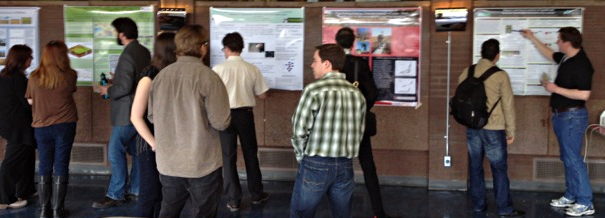“You Are Here: Interdisciplinary Perspectives
on Spatial and Temporal Change”
The Department of Geography and Environmental Studies (DGES) Graduate Advisory Committee is thrilled to welcome you to the 2015 DGES Student Research Conference. The DGES Student Research Conference provides opportunities for students to share their research and make lasting connections within the department. If you’re a student attending Carleton University and want to share your ideas or learn about research being conducted at the University, then save the date for May 1st, 2015 and register today!
When & Where
- Date: Friday, May 1, 2015
- Time: 9:00 AM – 4:30 PM
- Location: UDC Loeb Lounge- registrations, coffee, lunch
Loeb C264- oral presentations
Loeb A211- poster presentations
Conference Features:
- Keynote Speaker: John Stone presents:
Title: “Climate Change – From Science to Policy”
Abstract: Climate change is a threat to the environment and society. This talk will explain the science behind the threat and discuss what needs to be done to address it. Although there are elements of the climate system that we still don’t fully understand, much of the science is now well-established. It is not new science. Nor are the solutions new. However, we are running out of time to act in order to avoid severe, pervasive and irreversible impacts. While climate change is a threat it can also be looked upon as an opportunity – an opportunity to make a transition to a more sustainable economy, to a more secure and equitable World, and to new technologies and energy sources that will create further growth.
- Oral and poster presentations by you and your colleagues
- Panel of geography graduates working in non-academic fields
- Free Coffee and light luncheon provided to attendees
Schedule
| 8:30 – 9:00 | Registrations |
| 9:00 – 9:15 | Opening Statements |
| 9:15 – 10:00 | Keynote Speaker: John Stone |
| 10:00 – 10:20 | Coffee Break |
| 10:20 – 12:00 | Talk Session 1 |
| 12:00 – 12:50 | Lunch |
| 12:50 – 2:30 | Talk Session 2 |
| 2:30 – 3:15 | Poster Session and Coffee Break |
| 3:15 – 4:30 | Panel of Geographers and Closing Activities |
Participants
Oral Presentations
Session 1
• Laura Salisbury
– Evaluating the effectiveness of 3D geovisualization tools to communicate climate change effects: a case study focused on education, engagement, and motivation on PEI
• Omar Bani-Taha
– Investigating the Potential of Tabletop Natural User Interfaces Tools in Improving the Nunaliit Cybercartographic Atlas Framework
• Koreen Millard
– On the importance of training data sample selection in RF classification: a case study in peatland ecosystem mapping
• Jon Careless
– Investigating Evolutions in CMHC’s Affordable Housing Policies (mid-1990s-2000s) Using Bob Jessop’s Strategic Relational State Model
• Asli Mahdi
– The lived health geographies of graduate student research
Session 2
• Leah Ronayne
– Freshwater Security in the Inuvialuit Settlement Region (ISR), NWT, Canada
• Trung Nguyen
– Community resilience in the face of changing climate: Insights from a rural community in Vietnam
• Justin Stefanik
– The Normalization of Palliser’s Triangle 1860 – 1940
• Graham Clark
– Constructing a watershed scale peatland: two years in
Poster Presentations
• Elizabeth Cowan
– Differences in CH4 dynamics among plant community types during a wet summer at Mer Bleue bog, Ottawa
• Alex dePaiva
– Discourses of Ecological Responsibility: A Study of Canadian Trappers
• Claire Elliott
– Relating Low Arctic Tundra – Atmosphere CO2 Exchange to Satellite-Derived NDVI using Phenological Analysis at Daring Lake, NWT
• Michelle Fairbrother
– Effects of compositional and configurational heterogeneity on biodiversity in eastern Ontario farmland
• Emily Lindsay
– Mapping rangeland and forage resources in the Canadian Prairies using remotely sensed and geo-spatial data
• Cassandra Michel
– Tracer based analysis of groundwater and surface water interactions in the Jock sub-watershed, Ontario, Canada
• Bob Oikle
– Nunaliit: A Tool For Historical Scholarship
• Brendan O’Neill
– Permafrost conditions across an Arctic alpine tree line in the continuous permafrost zone, NWT, Canada
• Samantha Piquette
– Does CAN-DNDC Effectively Predict Water Use Efficiency in Canadian Alfalfa crops? – An Assessment of Model Accuracy and Uncertainty
• Jill Rajewicz
– Characterization of freshwater drainage under the Milne Ice Shelf, Ellesmere Island, Nunavut
Important Notes
- Please complete the registration form by Tuesday, April 7, 2015 @ 11:59 PM
- Participants will be contacted April 13th, 2015 to confirm presentation and poster scheduling/details
- COST: FREE (coffee and a light luncheon will be served)
- For more information and continuing updates please see our Facebook page
- If you have any questions please email the Graduate Committee
If you’re a DGES student who is presenting a poster at this year’s DGES conference, please make sure to fill out a Poster Printing Work Request Form if printing in the department. New to poster making and not sure where to start? Please see this help document on creating posters.
